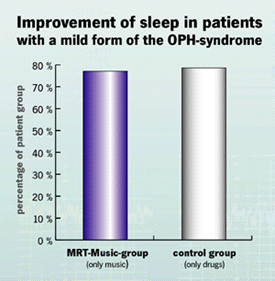Under investigation were pregnant women in the third trimester of pregnancy with a mild degree of OPH-syndrome (gestosis – nephropathy – with swellings at the feet, later at the whole body, hypertension, too much protein in urine).
For 7-10 days 13 women listened to the Medical Resonance Therapy Music® in the morning and after lunch and had no other therapy during these days. All 13 patients complained about sleep disorders.
Through the treatment with the Medical Resonance Therapy Music® sleep improved in 10 of them (77%).
The women in this group received sedative and hypotensive drugs as well as a phytotherapeutic treatment.
Here 14 women were under investigation, all of which suffered from sleep disorders which were treated with medical drugs.
The drug therapy had a comparable success: in 11 women (78,5%) sleep improved.
Investigators:
Prof. Dr. med. G. Gerassimowitsch
Prof. Dr. med. Walentina Sidorenko
Dr. med. Swetlana Scheleg
